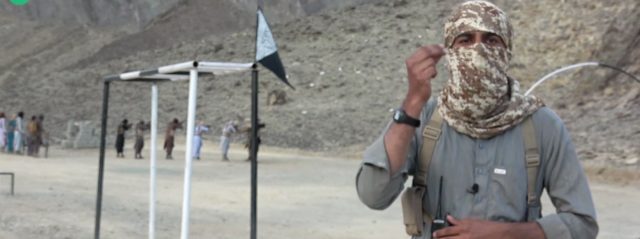A jihadist group of Balochis, an oppressed and impoverished minority in Iran, claimed responsibility Tuesday for an attack that reportedly killed at least five members of Iran’s Islamic Revolutionary Guard Corps (IRGC) and took three others prisoner.
The attack was apparently launched in retaliation to the IRGC’s massacre of Balochi fuel smugglers last week.
Kurdish news service Rudaw quoted a group calling itself Jaish al-Adl, or the “Justice Army,” claiming its fighters “successfully targeted two IRGC vehicles” in the town of Bampasht Tuesday.
Iranian state media confirmed the attack, quoting the deputy governor of Sistan-Baluchistan province claiming Jaish al-Adl attacked a vehicle belonging to a “technical unit” of the IRGC.
Iranian officials said “one of the IRGC engineers was wounded and another one is unaccounted for,” while Rudaw cited local news outlets that reported at least five IRGC troops were killed and three taken prisoner.
Jaish al-Adl is a Sunni Muslim extremist group that appeared around seven years ago, picking up from an insurgent group called Jundallah (“Soldiers of God”) that was severely weakened when Iran captured and executed its leader in 2010. The Iranian regime derisively refers to the group as “Jaish al-Zolm,” or the “Army of Injustice,” and claims it is covertly supported by the United States, Israel, Saudi Arabia, and the United Arab Emirates, in addition to enjoying support from ethnic Balochi tribes in Pakistan.
Jaish al-Adl and other Baluchistan militant groups have kidnapped or killed Iranian soldiers on several previous occasions, including an October 2013 ambush that killed 14 Iranian border guards to purportedly avenge “the ferocious massacre carried out by the Islamic Revolutionary Guards Corps in the Islamic land of Syria,” and a suicide bombing on a bus in February 2019 that killed at least 27 IRGC members.
The Trump administration added Jaish al-Adl to the list of “specially designated nationals,” along with a laundry list of other Baluchistan militant groups, in July 2019.
Many impoverished residents of Sistan-Baluchistan try to eke out a living by smuggling cheap, government-subsidized fuel out of Iran and selling it in Afghanistan or Pakistan. Tehran quietly indulges these “fuel traders” because their smuggling operations help to alleviate the grinding poverty of the Balochis, but the IRGC cracked down on them last week, sealing the border and opening fire on the traders. The IRGC used more deadly force to suppress subsequent protests in the provincial capital of Saravan.
The Iranian opposition group PMOI/MEK said Tuesday that protests against the killing of the fuel traders are still ongoing in towns across the Sistan-Baluchistan province “despite heavy measures by the regime” to suppress them.
Also on Tuesday, Amnesty International (AI) called for an investigation of the “unlawful killings of destitute fuel porters” by the IRGC.
“By opening fire on a group of unarmed people, Iranian security forces have displayed a callous disregard for human life. There must be urgent, independent criminal investigations into these unlawful killings, in line with international law and standards. Anyone against whom there is sufficient admissible evidence must be prosecuted in a fair trial, without resorting to the death penalty,” said AI Deputy Director for the Middle East and North Africa Diana Eltahawy.

COMMENTS
Please let us know if you're having issues with commenting.